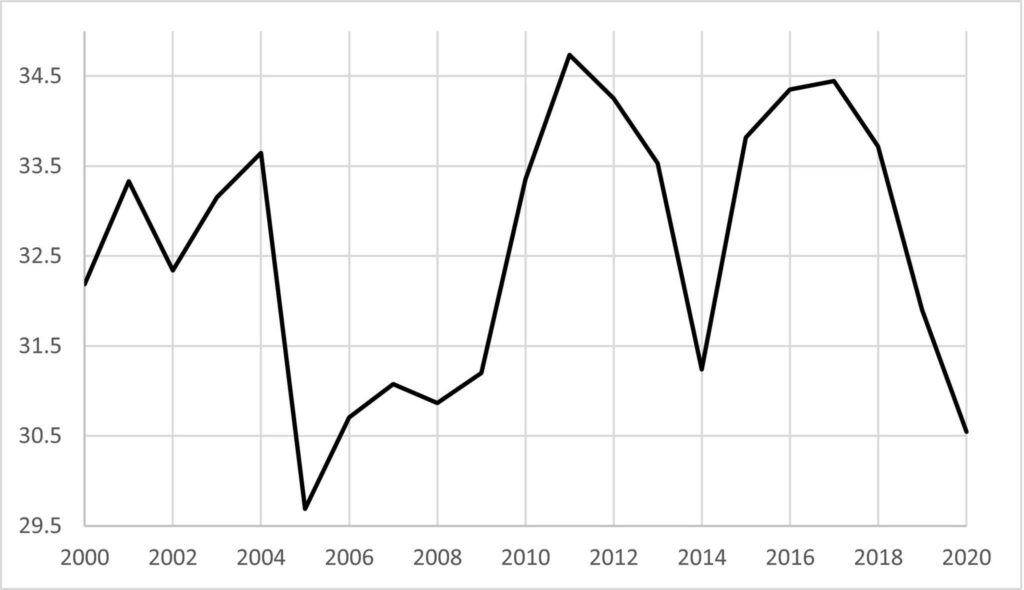The thicker the officials in the country’s cabinet of ministers, the greater the corruption in this country!
Ukrainian researcher Pavlo Blavatsky, who teaches at the French Business School in Montpellier, came to this conclusion. Mr. Blavatsky received this year’s Ig Nobel Prize in the nomination “Economics” for this research.
The Ig Nobel Prizes were created in 1991 by Marc Abrahams, American popular science communicator. Ten prizes are awarded each year in many categories: literature, physics, chemistry, medicine, public health, engineering, etc. Prizes are given for real achievements, whether funny or strange. By the way, Andre Geim, who had been awarded an Ig Nobel Prize in 2000 for levitating frogs by magnetism, was awarded a real Nobel Prize in 2010 for his work with the electromagnetic properties of graphene!

The meeting with Pavlo Blavatsky was organized for the Ukrainian audience by the coordinator of the lecture course “Scientific Meetings”, a senior researcher at the G.M. Dobrov Institute for Research of Scientific and Technical Potential and History of Science of the National Academy of Sciences of Ukraine, Serhiy Zhabin. During the presentation of the laureate, Mr. Zhabin emphasized that the motto of this award is: first you laugh, and then you think!
Pavlo Blavatsky’s paper “Obesity of Politicians and Corruption in Post-Soviet Countries” was published in the journal “Economics of Transition and Institutional Change”. It immediately brought the author world fame, without exaggeration: the media in many countries around the world wrote about the work of the scientist. The author received requests from South America and Africa for conducting similar study in their countries. By the way, scientists from Australia were inspired by the example of the scholar, they want to conduct a similar study. “I have written 57 papers in 20 years, but the last one, about obesity and corruption, has aroused more interest than other 56 taken together,” Mr. Blavatsky smiles. “Journalists from all over the world call me day and night. It means that the issue of correct measurement of corruption is really important.”
The idea to conduct the study appeared incidentally. Pavlo Blavatsky has learned that an actor who plays a role of a politician who fights corruption in a TV serial, has been elected President in Ukraine. The economist understood that the corruption problem is so “hot” that people are ready to vote for the dream, for the actor who is combating this problem in the film.
He thought, and he did it! The researcher began to analyze the criteria of the corruption definition, and quickly realized that practically there are no indicators to measure it.
“Standard indicators and research are based on surveys of international experts,” the scientist continues. “Businessmen or representatives of the International Monetary Fund come to Ukraine and then tell what impression they have about corruption in the country.” In other words, these corruption indices aggregate the subjective opinions of international experts. And if we take into account that different countries have different ideas about this problem, the results of the polls are very subjective.
The scientist began to study the “theoretical basis” and found much evidence of invitation of senior officials to restaurants and buffets. He realized that corrupt officials like this form of “thanksgiving”, because there are no hazardous envelopes with money during lunch or a buffet. Hence, a disguised photographer will not snap a picture with his hidden camera at the moment when this envelope is put in the official’s pocket which is already full of similar envelopes.
One bad thing is that numerous buffets organized by those who want “to solve the problem” the worst way, offer a lot of delicious food and alcohol. It is difficult to refuse viands (and pleasant conversations during which you will be told that you are the greatest official of our time), but it is even more difficult to dispose of the gained weight. “I examined the weight of government representatives in 15 post-Soviet countries over 20 years and I am convinced that there is a correlation between the overweight of officials and the level of corruption in the country,” Pavlo Blavatsky says.
What’s interesting is that the scientist analyzes the entire government at once (he calculated the overall average weight index of high-ranking officials). In the case of a reshuffle in the government, when two (or three) people held one ministerial position in one year, the scientist chose the person who held the position for the longest time.
He downloaded the image from two photobanks (photo.ukrinform.ua and photo.unian.ua). He found the missing photos in the Ukrainian media.
During the study, the scientist also used artificial intelligence technology, the artificial neural network. Before downloading photos of the officials, the researcher “trained” using random images.

A total of 469 frontal images of Ukrainian ministers in office in 2000–2020 were collected and analyzed. In each image, the minister’s body mass index was estimated using a computer algorithm (Kocabey et al). Pavlo Blavatsky compared these indices with two current indicators of corruption: the World Bank’s Corruption Control indicator and the number of luxury watches exported from Switzerland to Ukraine (according to Swiss statistics) and imported to Ukraine from Switzerland (according to Ukrainian statistics).
The results of the study were very interesting. World Bank indicators show that Ukraine entered the 2000s with relatively massive corruption, which fell to the lowest level ever in 2005 (i.e., after the Orange Revolution).
The second wave (according to the World Bank) peaked in 2013, then declined and rose again.
The results of the scientist (relative to body weight) were similar! The government during Viktor Yushchenko’s presidency (2005) was the slimmest. “Particularly striking is the fact that in 2005 Ukraine had the lowest level of corruption, the slenderest government and almost no “missed” luxury Swiss watches,” Blavatsky wrote in the published paper.
The scientist says that he is often asked: maybe the overweight of officials is just a sign of our time, when “not very slender” people really grow in number? Unfortunately, no: the study shows that there are 40-50 percent of such ministers in some countries. These are people whose weight is dangerous to their health. By the way, according to the study only 3 percent of officials have a normal weight. The slimmest governments are in Lithuania, Latvia, Estonia and Georgia.
The researcher also tested another hypothesis: whether the weight of politicians is a sign of the tendency of most people in this country to corpulence. But no! Research has shown that the thicker the politicians, the slimmer the population.
There are also many comments on Pavlo Blavatsky’s Facebook page, where he posted his scientific paper. One of the researchers working in Africa writes: “I thought that only I noticed that the more corrupt the country, the stouter the officials))) Now I work in Africa and I see that politicians and officials look normal in countries where the situation is normalizing. And the “high and mighties” look like Roly-Poly in those countries where everything is sad.
Svitlana GALATA
Svit newspaper, № 47 – 48, December 2021
